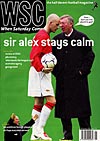 Apparent misfits in the Premiership, more than a few imports have gone on to have perplexingly good careers elsewhere. We tracked down three of them, Ernst Bouwes looking at Jon Dahl Tomasson
Apparent misfits in the Premiership, more than a few imports have gone on to have perplexingly good careers elsewhere. We tracked down three of them, Ernst Bouwes looking at Jon Dahl Tomasson
In the spring of 1997 his fellow players voted him Talent of the Year in the Dutch league, with Giovanni van Bronckhorst and Arnold Bruggink second and third. A couple of days after accepting the trophy, he scored a hat-trick against Vitesse Arnhem to go top of the goalscorers list, leaving quality players like Luc Nilis, Roy Makaay and Patrick Kluivert (and Gerald Sibon) behind him. While his goals took modest Heerenveen to their first Dutch Cup final, about 20 clubs were rumoured to be interested in signing him, with Ajax, Atlético Madrid and Barcelona the most persistent. A transfer fee of about £2 million seemed a laughably small amount for a 21-year-old who had just made his international debut for Denmark. Yes, we’re talking about Jon Dahl Tomasson.
It was the shrewd investor Kenny Dalglish of Newcastle who outpaced the European elite and talked “the new Michael Laudrup” into signing a five-year deal at the end of April. Then Newcastle qualified for the Champions League. What could possibly go wrong? Well, Tomasson stopped scoring goals for one thing, failing to find the net again for Heerenveen until the end of the season, losing the cup final and his position as the league’s top scorer in the process.
Never mind. According to Dalglish’s plans, Jon Dahl was to support Alan Shearer from a midfield position, which worked very well until the captain broke his ankle in a pre-season match. His place was taken by Faustino Asprilla and again Tomasson seemed to thrive in his role as Newcastle humiliated Barcelona in the first game of the Champions League. But when the Colombian was also injured there was only veteran Ian Rush left as a possible replacement and he was clearly past it, so Dalglish delegated Tomasson to play up front. In an interview with the Dutch magazine Voetbal International after his return to Holland, Tomasson said he had no choice.
“When two super strikers are injured, somebody has to go up there, so I went, but it is not my position and it showed. In the two games I played from midfield I scored, but never as a striker. When Shearer came back I lost my place and never won it back. For the rest of the season Dalglish left me on the bench and then eventually even in the stands.”
His manager at Heerenveen, Foppe de Haan, had kept in touch and suggested Tomasson leave England as soon as possible once it became clear Dalglish was choosing other options after Christmas. According to De Haan, Tomasson still needed a lot of training to develop as a player. But in England there are so many games that the aim of training sessions only seemed to be to maintain standards, not to raise them. Wasting time at Newcastle caused Tomasson’s career to stall and culminated in him being overlooked for the Denmark squad that went to the World Cup in France.
Just a couple of months before the arrival of Ruud Gullit, who probably would have used him a lot more than Dalglish, Tomasson decided to accept a wage cut and returned to Holland. There he played a pivotal role in Feyenoord’s 1999 championship and their march into the second round of the Champions League the following season. He failed to make his mark at Euro 2000, but in the qualifying games for the coming World Cup he scored a couple of decisive goals in a very tight group, one the crucial winner ten minutes from time in the home match against the Czech Republic.
In fact, of all the outfield players at Newcastle United in the 1997-98 season, Tomasson will be the only one playing on the world stage next summer.
From WSC 179 January 2002. What was happening this month